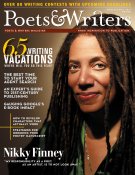To submit a question for the next featured agent, e-mail agentadvice@pw.org or write to Editor, Poets & Writers Magazine, 90 Broad Street, Suite 2100, New York, NY 10004. Questions accepted for publication may be edited for clarity and length.
 Areas
of interest:
Fiction, memoir, narrative nonfiction, food writing, and cookbooks
Areas
of interest:
Fiction, memoir, narrative nonfiction, food writing, and cookbooks
Representative clients: Steven Arntson, Sarah Gardner Borden, Lauren Shockey, Maria Speck, Emma Straub
Looking for: Query letter and the first page of the manuscript
Preferred contact: E-mail jenni@brickhouselit.com
Agency
contact:
Brick House Literary Agents
80 Fifth Avenue, Suite 1101
New York, NY 10011
(212) 255-5117
www.publishersmarketplace
.com/members/woffordgirand
Do agents really read synopses? Isn’t a ten-page sample more useful?
Brian from Portland, Oregon
For me, fiction synopses that detail every step of the plot are hard to read and fairly useless. The same description might yield work that’s boring, amazing, or ridiculous; it’s all in the execution. The ability to talk coherently and convincingly about your work is important, though. I like a query that communicates the book’s territory, feel, and type; your influences and credits; and, above all, a sense that you know what you’re trying to do. And then it’s on to the work itself. To that end, I ask for a query and the first page. One book I’m extremely excited about is a debut novel, Games to Play After Dark, by Sarah Gardner Borden (Vintage, May). It’s about a young marriage falling apart—a common subject, but the writing, sensibility, and quality of insight bowled me over. (First sentence: “Kate and Colin met at a party thrown by Kate and her West Twelfth Street apartment mate, Darcy, a party Colin turned up at only by happenstance, knowing neither Kate nor Darcy and tagging along with a friend of a friend.”) I look for authority—the sense that I’m in the capable hands of a real storyteller. Of course, you should follow the guidelines of the agent you’re querying.
What kind of publicity is a publisher apt to offer a midlist author? Can this be negotiated, or is the author still going to pay out of pocket for a ten-date tour in key cities?
Doug from Rockford, Illinois
It varies widely, but most midlist fiction authors won’t be sent on ten-date tours. They’ll be encouraged to give readings in cities where they live or where they can guarantee a substantial audience. It’s become more cost effective for the author to reach out via the Internet. Moreover, it’s a recipe for depression to take an author far from home and have him read his novel to the events coordinator and the ubiquitous crazy guy. If you want to help make tours viable again, start by attending a local reading by an author you haven’t heard of, and buy her book.
I’m building up my publishing credits, maintaining a blog, coordinating a monthly writers group, and working on finishing up my novel. I have confidence that I can finish the book within six months. At what point should I start looking for the agent to represent me? Should the book be finished first, or should I remain open to editorial suggestions? I’ve read articles about how to approach agents, but very few on when.
Tammy from Buffalo, New York
You should wait until you’re really finished (and have set the book aside and finished it twice more!) before querying agents. This may sound like a Zen koan, but you should be finished and open to editorial suggestions. If you dream of locking in an agent before finishing your novel, the best way is to publish pieces of your work in literary journals, to build your credits and get your name out there. Agents are actively looking for talented writers, and I do represent a number of writers whose short fiction is exceptional and whose first novels I’m patiently anticipating. But by and large the first order of business is putting in the work of writing and rewriting that compelling first novel. If the novel is terrific, finding an agent is actually the easy part.









